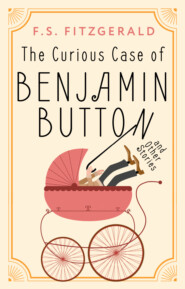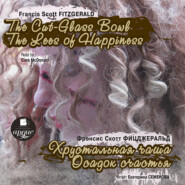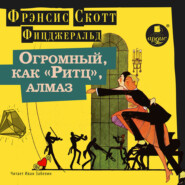По всем вопросам обращайтесь на: info@litportal.ru
(©) 2003-2024.
✖
F. Scott Fitzgerald Collection: The Great Gatsby, The Beautiful and Damned and Tender is the Night
Год написания книги
2019
Настройки чтения
Размер шрифта
Высота строк
Поля
“It was in nineteen-nineteen, I only stayed five months. That’s why I can’t really call myself an Oxford man.”
Tom glanced around to see if we mirrored his unbelief. But we were all looking at Gatsby.
“It was an opportunity they gave to some of the officers after the Armistice,” he continued. “We could go to any of the universities in England or France.”
I wanted to get up and slap him on the back. I had one of those renewals of complete faith in him that I’d experienced before.
Daisy rose, smiling faintly, and went to the table.
“Open the whiskey, Tom,” she ordered, “and I’ll make you a mint julep. Then you won’t seem so stupid to yourself … Look at the mint!”
“Wait a minute,” snapped Tom, “I want to ask Mr Gatsby one more question.”
“Go on,” Gatsby said politely.
“What kind of a row are you trying to cause in my house anyhow?”
They were out in the open at last and Gatsby was content.
“He isn’t causing a row.” Daisy looked desperately from one to the other. “You’re causing a row. Please have a little self-control.”
“Self-control!” repeated Tom incredulously. “I suppose the latest thing is to sit back and let Mr Nobody from Nowhere make love to your wife. Well, if that’s the idea you can count me out … Nowadays people begin by sneering at family life and family institutions, and next they’ll throw everything overboard and have intermarriage between black and white.”
Flushed with his impassioned gibberish, he saw himself standing alone on the last barrier of civilization.
“We’re all white here,” murmured Jordan.
“I know I’m not very popular. I don’t give big parties. I suppose you’ve got to make your house into a pigsty in order to have any friends – in the modern world.”
Angry as I was, as we all were, I was tempted to laugh whenever he opened his mouth. The transition from libertine to prig was so complete.
“I’ve got something to tell you, old sport—” began Gatsby. But Daisy guessed at his intention.
“Please don’t!” she interrupted helplessly. “Please let’s all go home. Why don’t we all go home?”
“That’s a good idea.” I got up. “Come on, Tom. Nobody wants a drink.”
“I want to know what Mr Gatsby has to tell me.”
“Your wife doesn’t love you,” said Gatsby. “She’s never loved you. She loves me.”
“You must be crazy!” exclaimed Tom automatically.
Gatsby sprang to his feet, vivid with excitement.
“She never loved you, do you hear?” he cried. “She only married you because I was poor and she was tired of waiting for me. It was a terrible mistake, but in her heart she never loved any one except me!”
At this point Jordan and I tried to go, but Tom and Gatsby insisted with competitive firmness that we remain – as though neither of them had anything to conceal and it would be a privilege to partake vicariously of their emotions.
“Sit down, Daisy,” Tom’s voice groped unsuccessfully for the paternal note. “What’s been going on? I want to hear all about it.”
“I told you what’s been going on,” said Gatsby. “Going on for five years – and you didn’t know.”
Tom turned to Daisy sharply.
“You’ve been seeing this fellow for five years?”
“Not seeing,” said Gatsby. “No, we couldn’t meet. But both of us loved each other all that time, old sport, and you didn’t know. I used to laugh sometimes” – but there was no laughter in his eyes – “to think that you didn’t know.”
“Oh – that’s all.” Tom tapped his thick fingers together like a clergyman and leaned back in his chair.
“You’re crazy!” he exploded. “I can’t speak about what happened five years ago, because I didn’t know Daisy then – and I’ll be damned if I see how you got within a mile of her unless you brought the groceries to the back door. But all the rest of that’s a God damned lie. Daisy loved me when she married me and she loves me now.”
“No,” said Gatsby, shaking his head.
“She does, though. The trouble is that sometimes she gets foolish ideas in her head and doesn’t know what she’s doing.” He nodded sagely. “And what’s more, I love Daisy too. Once in a while I go off on a spree and make a fool of myself, but I always come back, and in my heart I love her all the time.”
“You’re revolting,” said Daisy. She turned to me, and her voice, dropping an octave lower, filled the room with thrilling scorn: “Do you know why we left Chicago? I’m surprised that they didn’t treat you to the story of that little spree.”
Gatsby walked over and stood beside her.
“Daisy, that’s all over now,” he said earnestly. “It doesn’t matter any more. Just tell him the truth – that you never loved him – and it’s all wiped out forever.”
She looked at him blindly. “Why – how could I love him – possibly?”
“You never loved him.”
She hesitated. Her eyes fell on Jordan and me with a sort of appeal, as though she realized at last what she was doing – and as though she had never, all along, intended doing anything at all. But it was done now. It was too late.
“I never loved him,” she said, with perceptible reluctance.
“Not at Kapiolani?” demanded Tom suddenly.
“No.”
From the ballroom beneath, muffled and suffocating chords were drifting up on hot waves of air.
“Not that day I carried you down from the Punch Bowl to keep your shoes dry?” There was a husky tenderness in his tone … “Daisy?”
“Please don’t.” Her voice was cold, but the rancor was gone from it. She looked at Gatsby. “There, Jay,” she said – but her hand as she tried to light a cigarette was trembling. Suddenly she threw the cigarette and the burning match on the carpet.
“Oh, you want too much!” she cried to Gatsby. “I love you now – isn’t that enough? I can’t help what’s past.” She began to sob helplessly. “I did love him once – but I loved you too.”
Gatsby’s eyes opened and closed.
“You loved me too?” he repeated.
“Even that’s a lie,” said Tom savagely. “She didn’t know you were alive. Why – there’re things between Daisy and me that you’ll never know, things that neither of us can ever forget.”

















